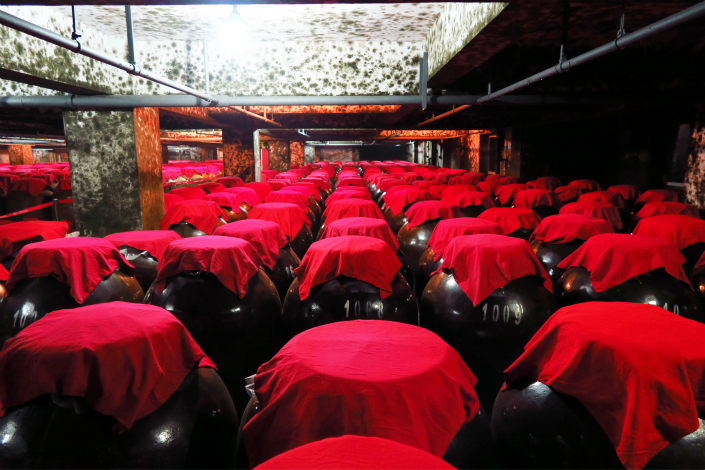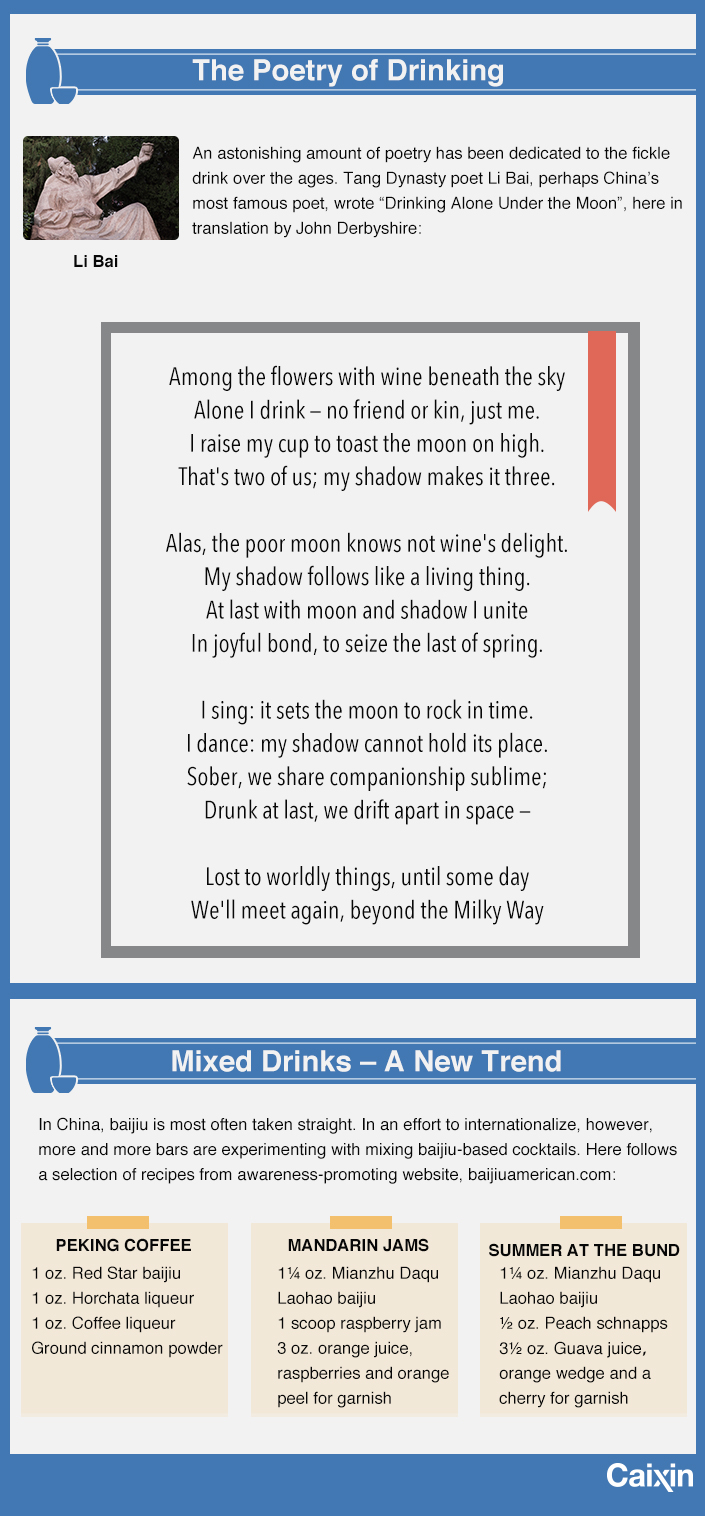Everything You Always Wanted to Know About Baijiu But Were Too Sober to Ask
To succeed in business in China, it helps to be able to understand the drinking culture that goes hand in hand with the business culture. Caixin puts the spotlight on baijiu, a brew popularly known as “China’s national liquor.”
It’s just after dinner. A group of businessmen are celebrating the signing of a deal. Tie partly undone, face ruddy, one proposes a toast, thanking the host for the meal as they all raise their little glasses. The clinking happens just above the table top, almost touching the empty dishes. Polite culture prescribes that one must clink one’s glass lower than that of the other, initiating a literal race to the bottom over the dinner table.
A scene such as the one above is common in any Chinese business context. And the guest of honor is baijiu. The name of the clear beverage is pronounced roughly like “Bye, Joe!” and literally means “white liquor,” although that translation is as monochrome as calling wine a “red drink.” The alcohol content varies, but is commonly over 50%, ensuring that only the hardy can participate in the fun.
Baijiu is brewed mostly from sorghum. Sorghum? While the sorghum plant is not in most Westerners’ vocabularies, it is widely used around the world as an ingredient in staples such as Indian roti, Honduran tortillas and Nigerian tuwo. The grain, related to millet, has also become an important part of the Chinese economy given its links to baijiu.
 |
A temperature-controlled cellar at the Mianchi Yangshao distillery in Sanmenxia, Henan province, holds tens of thousands of tons of the Chinese liquor baijiu in December 2015. Photo: Visual China |
But what about all the rice that there is in China? Isn’t there something called rice wine? Yes! The less-powerful Japanese sake, which typically has an alcohol content below 20%, is made with rice, but China has many versions of its own. It’s yellower, sweeter and less strong than baijiu, more reminiscent of a fortified wine like Vermouth or port. One variant, conveniently called huangjiu, or yellow liquor, to distinguish it from its clear cousin, is a main ingredient in red braised pork, the favorite dish of Chairman Mao himself.
But does this fiery brew popular with business types have a future? Younger generations drink less, but a growing middle class is increasingly able to substitute cheaper forms of baijiu with more high-end ones, which suggests the market might still expand. The question remains: Will baijiu be flowing in pubs worldwide anytime soon? Try it and judge for yourself.
Know your baijiu brands
Erguotou: Literally “head of the second pot,” this is a relatively cheap distillation, and as a result the most widely consumed variety of baijiu. It is primarily associated with Beijing. If you see the name on a bottle, think about canceling some of your appointments the next day. It also comes in 5-liter bottles. Price: $1 to $5 per 500-milliliter bottle.Maotai: This brand is legendary for the uncompromising quality of its ingredients, and its multiple distillations. Henry Kissinger is rumored, on a trip to China, to have said: “I think if we drink enough Maotai we can solve anything.” Former foreign minister Cen Yi is known to have written a poem entitled “We’ll Meet Again in Nanjing and Drink Maotai.” Price: Modest bottles can be found for $60-$100 per 500-milliliter bottle. The upper limit continues to expand at auction sales throughout China.
Luzhou Laojia: A classic with sky-high sales numbers, the Luzhou Laojia was designated a national treasure by the State Council in 1996. It is considered the best representative of the “strong fragrance” type of baijiu. Price: $30-$70 per 500-milliliter bottle, though prices can go higher.
Wuliangye: With purported historical roots in the Song dynasty, Wuliangye is another heavyweight, known to everyone in China. It mixes sorghum with different types of rice, wheat and corn for a fuller flavor. Price: $40-$90 per 500-milliliter bottle, but prices go (much) higher.
 |
Christian Føhrby was an intern at Caixin.

- PODCAST
- MOST POPULAR





